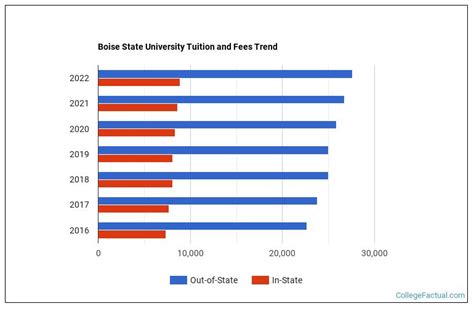Understanding Boise State University’s Tuition Structure
Boise State University (BSU) is a public research university located in Boise, Idaho. As with all educational institutions, BSU’s tuition fees vary depending on several factors, including residency status, program of study, and academic level. This comprehensive guide will provide a detailed overview of BSU’s tuition fees, ensuring that students and families have a clear understanding of the financial investment required to attend the university.

In-State vs. Out-of-State Tuition
One of the primary factors that determine tuition fees at BSU is residency status. Idaho residents are eligible for in-state tuition rates, which are significantly lower than out-of-state tuition rates. For the 2023-2024 academic year, in-state undergraduate students pay per-credit hour:
$340.72 (lower division)
$393.28 (upper division)
Out-of-state undergraduate students pay per-credit hour:
$913.44 (lower division)
$1,044.00 (upper division)
Graduate Tuition Rates
Graduate tuition rates at BSU are also based on residency status. For the 2023-2024 academic year, in-state graduate students pay per-credit hour:
$434.04 (master’s programs)
$868.08 (doctoral programs)
Out-of-state graduate students pay per-credit hour:
$1,161.28 (master’s programs)
$2,322.56 (doctoral programs)
Additional Fees
In addition to tuition fees, BSU students are also responsible for a variety of other expenses, including:
- Technology fee: $245 per semester
- Student activity fee: $274 per semester
- Health center fee: $218 per semester
- Parking permit: $108-$396 per year (optional)
Financial Aid and Scholarships
BSU offers a range of financial aid opportunities to help students cover the cost of tuition and other expenses. These opportunities include:
- Federal and state grants
- Scholarships
- Loans
- Work-study programs
Students who demonstrate financial need may be eligible for federal Pell Grants, which do not have to be repaid. BSU also offers its own scholarship program, which awards scholarships to students based on academic merit, financial need, and other factors.
Common Mistakes to Avoid
When budgeting for college expenses, it is important to avoid common mistakes, such as:
- Underestimating the total cost of attendance, which includes not only tuition but also housing, meals, transportation, and other expenses.
- Assuming that all financial aid will cover the full cost of attendance.
- Not completing the Free Application for Federal Student Aid (FAFSA), which is the first step in applying for federal and state financial aid.
Frequently Asked Questions (FAQs)
Q: What is the deadline to apply for financial aid?
A: The FAFSA opens on October 1st for the following academic year. To maximize your financial aid award, it is recommended to apply by the state’s priority deadline.
Q: Can I request a payment plan to spread out my tuition payments?
A: Yes, BSU offers a variety of payment plans that allow students to pay their tuition in monthly installments.
Q: What if I am having difficulty paying my tuition bill?
A: If you are experiencing financial hardship, contact BSU’s Financial Aid Office immediately. They can provide you with information about financial aid options and payment plans.
Q: How do I apply for a scholarship?
A: BSU’s Office of Scholarships and Fellowships manages the university’s scholarship program. Students can apply for scholarships through the university’s scholarship portal.
Q: What is the average cost of housing near BSU?
A: The average cost of off-campus housing near BSU varies depending on the type of housing and its location. However, students can expect to pay between $600-$1,200 per month for rent.
Q: Are there any other resources available to help me pay for college?
A: In addition to financial aid and scholarships, there are a number of other resources available to help students pay for college, such as work-study programs and part-time employment. Students can also explore grants and scholarships offered by private organizations.
